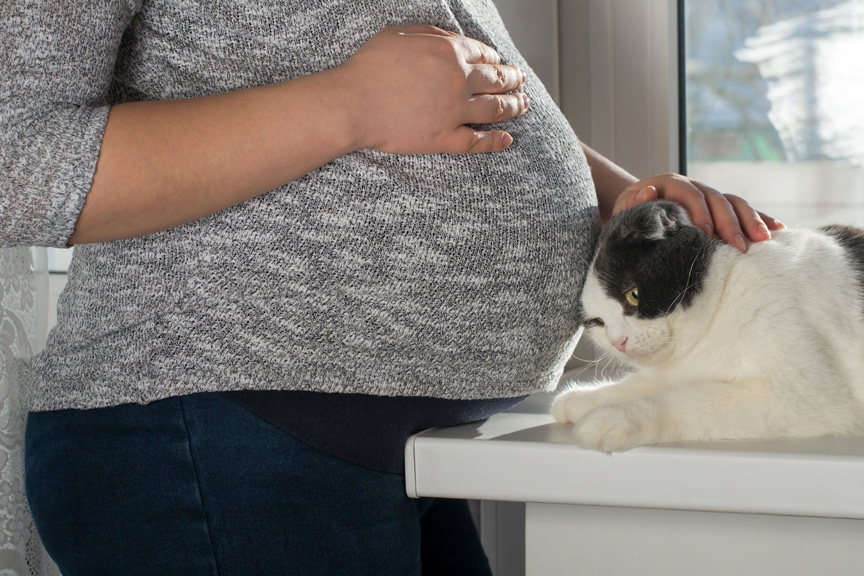- Health
Pregnant and have pets? Read this

In this article you’ll find answers to questions like:
-
If you are pregnant, should you change how you care for a cat?
-
If you are pregnant and have a dog, what behaviors should you address?
-
What about other pets?
With a baby on the way, you need to think about how you care for some other members of your household — your pets. Pets can pose hazards.
1. IF YOU ARE PREGNANT, SHOULD YOU CHANGE HOW YOU CARE FOR A CAT?
Cats can carry an infection known as toxoplasmosis, which is caused by a parasite. That parasite can be in their waste or in dirt in areas where cats frequent. You need to make sure:
-
Someone who isn’t pregnant changes the cat’s litter frequently.
-
To keep your cat inside away from stray cats.
-
Wash your hands thoroughly if you absolutely must touch cat waste.
-
Don’t feed your cat undercooked meat.
-
If you have a sandbox, cover it up.
2. IF YOU ARE PREGNANT AND HAVE A DOG, WHAT BEHAVIORS SHOULD YOU ADDRESS?
So there aren’t bacteria, viruses and other dangers to worry about, you should address these behaviors:
-
Make sure your dog doesn’t hop on your lap.
-
Address behaviors like biting or jumping now before the baby arrives.
-
Make sure vaccinations are current.
-
Have another member of the household spend more time with the dog so they don’t feel neglected when the baby arrives.
3. WHAT ABOUT OTHER PETS?
Hamsters, guinea pigs and mice:
With these animals, you need to be careful of getting the lymphoctic choriomeningitis virus (also called LCMV), which can cause birth defects and miscarriage. You can get it from a bite or touching or breathing in material from the animal’s cage.
Symptoms of LCMV include fever, fatigue, headache, muscle aches, vomiting and lack of appetite.
If you have pet rodents:
-
Remove them from the home or keep them in a different part of the house.
-
Wash your hands thoroughly after touching them and make sure family members do the same.
-
Have a family member clean the cage and generally care the animal.
-
Keep them away from your face and don’t let children kiss or hold them close to their faces.
Reptiles and amphibians
Sad news — these animals can carry the salmonella, which can cause pregnancy complications. It is generally recommended you remove them from the home before your baby is born and don’t have them in your home until your child is at least 5 years old.
SOURCE:
You May Also Like
-
- Health
- Parenting
- Things to do
Nutrition, exercise, less stress = healthy pregnancy, foundation
Did you know a mother's stress can have long-lasting effects on her unborn child? And that dental health is just as important as physical and mental health? Read on for more (perha …
Read More -
- Health
- Parenting
What to eat (and not) during pregnancy
With so much information out there, it can be hard to know what to eat, and what to stay away from, when you're expecting. This list of food you need, foods to avoid and foods to b …
Read More -
- Health
How pregnancy affects your dental health
Did you know that pregnancy can affect your gums and your teeth? When you are pregnant, more blood flows through your body, your hormone levels rise and there is more acid in your …
Read More
Related resources
-
- Health
- Other
- Parenting
Healthy Mothers, Healthy Babies Coalition of Palm Beach County
A safety net of local services and support for pregnant women and families with infants, focusing on racial disparities in birth outcomes
561-623-2800 Website -
- Health
- Parenting
March of Dimes
National information to improve infants' health by preventing birth defects, premature birth and infant mortality
561-684-0102 Website
